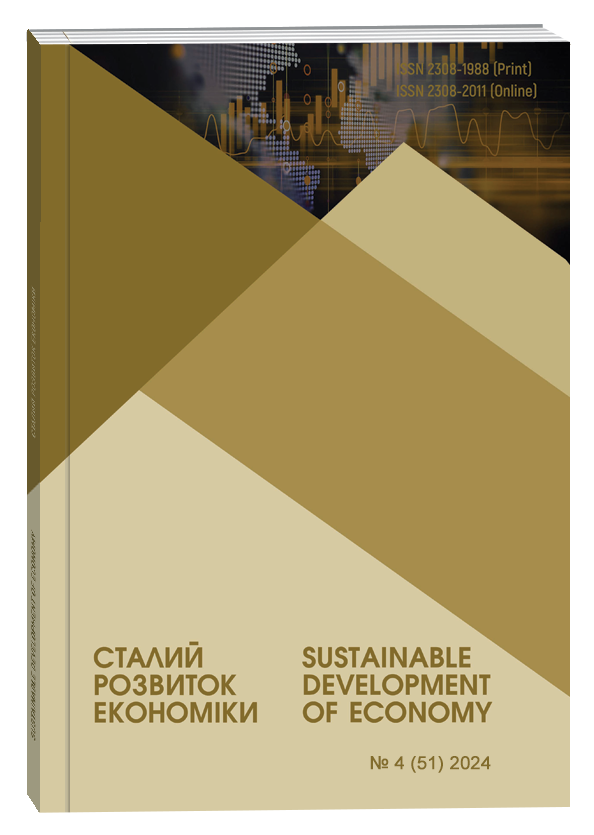IDENTIFICATION OF COMPLEMENTARY ZONES IN THE CHAIN “ENVIRONMENTAL TAXATION – RATIONAL NATURAL USE – ECONOMY SHADOWING – NATIONAL SECURITY”
Abstract
Environmental and economic challenges of the modern era require innovative approaches to ensure sustainable development for the state. The interdependence between the rational use of natural resources, tax policy, and economic transparency is a decisive factor in preserving ecosystems and biodiversity while ensuring long-term economic stability. The purpose of the article is to validate and substantiate the complementarity that arises from the de-shadowing of environmental taxes, promoting rational natural resource management, and ensuring national security. The study justifies the complementarity arising from de-shadowing environmental taxes, stimulating rational natural resource use, and enhancing national security. Trigger points of environmental taxation's impact on rational resource use, de-shadowing, and national economic security were identified. Using tools like VOSviewer, SciVal, Google Trends, and Google Books Ngram Viewer, three types of bibliometric analysis were conducted: exploring terms such as "Environmental tax" and "De-shadowing"; "Environmental tax" and "Rational nature management"; and "Environmental tax" and "National security." The bibliometric tools confirmed the chain’s complementarity: "environmental taxation – rational natural resource management – economic de-shadowing – national security". Specific instruments used include SciVal by Elsevier (validating the relevance of the study and the topic’s importance across disciplines), VosViewer (demonstrating the strong interconnections among the categories and pinpointing their trigger points of influence on environmental taxation), Google Trends (highlighting the growing relevance of environmental taxation through the lenses of national security, de-shadowing, and rational resource use) and Google Books Ngram Viewer (providing statistical insights relevant to the research context). The findings significantly contribute to developing effective state policies in environmental protection, optimizing tax systems to encourage ecological responsibility, reducing economic shadowing, and improving national security.
References
Podatkovyy Kodeks Ukrayiny: Kodeks vid 02.12.2010 No. 2755-VI. Avaiable at: https://zakon.rada.gov.ua/laws/show/2755-17#Text (in Ukrainian)
Tinʹova ekonomika v Ukrayini. Natsionalʹnyy bank Ukrayiny. Avaiable at: https://bank.gov.ua/ua/news/all/doslidjennya-tinovoyi-ekonomiki-v-ukrayini--mayje-chvert-vvp--abo-846-mlrd-griven--perebuvaye-v-tini (in Ukrainian)
Shvets Yu. O., Hryhorovych L. S. (2017) Ekolohichnyy podatok yak instrument ekonomiky pryrodokorystuvannya [Ecological tax as a tool of nature economy]. Economy and society, no. 10, рр. 488–493. Avaiable at: https://economyandsociety.in.ua/journals/10_ukr/85.pdf (in Ukrainian)
Makarova N. S. (2007) Ekonomika pryrodokorystuvannya: navch. Posib [Economics of nature use: teaching. Manual], K.: Center of Educational Literature, 322 p. (in Ukrainian)
Dragan I. V. (2011) Formuvannya ekoloho-ekonomichnoho mekhanizmu rehulyuvannya sfery pryrodokorystuvannya v Ukrayini [Formation of the ecological and economic mechanism of regulation of the field of nature use in Ukraine]. Bulletin of the Academy of the Customs Service of Ukraine, no. 1(4), pp. 31–37 (in Ukrainian)
Hlushchenko Y. I., Korohodova O. O., Moiseienko T. Y., Chernenko N. O. (2021) Konceptualjni zasady podatkovogho planuvannja pidpryjemstv u konteksti Chetvertoji promyslovoji revoljuciji [The Conceptual Principles of Tax Planning of Enterprises in the Context of Fourth Industrial Revolution]. Business Inform, no. 4, pp. 210–126. Available at: https://www.business-inform.net/article/?year=2021&abstract=2021_4_0_210_216&lang=ua (in Ukrainian)
Gorodetska T. E. (2022) Podatkove planuvannja jak forma podatkovoji polityky transportnykh pidpryjemstv [Tax planning as a form of tax policy of transport enterprises]. Ukrainian Journal of Applied Economics and Technology, vol. 7, no. 1, pp. 99–106. Available at: https://www.business-inform.net/article/?year=2021&abstract=2021_4_0_210_216&lang=ua (in Ukrainian)
Herweg F. (2024) Adoption of green technology with financial friction. Finance Research Letters, no. 71. DOI: https://doi.org/10.1016/j.frl.2024.106388
Jabeen G., Wang D., Pinzón S., Işık C., Ahmad M., Rehman A. and Anser M. K. (2025) Promoting green taxation and sustainable energy transition for low-carbon development. Geoscience Frontiers, no. 16(1). DOI: https://doi.org/10.1016/j.gsf.2024.101928
Sibdari S., Asayesh Y. (2024) Eco-drive or tax strive? Assessing consumer vehicle selection behavior under carbon taxation. Journal of Cleaner Production, no. 479. DOI: https://doi.org/10.1016/j.jclepro.2024.143869.
Податковий Кодекс України: Кодекс від 02.12.2010 № 2755-VI. URL: https://zakon.rada.gov.ua/laws/show/2755-17#Text (дата звернення 19.11.2024).
Тіньова економіка в Україні. Національний банк України. URL: https://bank.gov.ua/ua/news/all/doslidjennya-tinovoyi-ekonomiki-v-ukrayini--mayje-chvert-vvp--abo-846-mlrd-griven--perebuvaye-v-tini (дата звернення 19.11.2024).
Швець Ю.О., Григорович Л.С. Екологічний податок як інструмент економіки природокористування. Економіка і суспільство. 2017. № 10. С. 488–493. URL: https://economyandsociety.in.ua/journals/10_ukr/85.pdf.
Макарова Н.С. Економіка природокористування: навч. посіб. Київ : Центр учбової літератури, 2007. 322 с.
Драган І.В. Формування еколого-економічного механізму регулювання сфери природокористування в Україні. Вісник Академії митної служби України. 2011. № 1(4). С. 31–37.
Глущенко Я.І., Корогодова О.О., Моісеєнко Т.Є., Черненко Н.О. Концептуальні засади податкового планування підприємств у контексті Четвертої промислової революції. Бізнес Інформ. 2021. No 4. C. 210–216. URL: https://www.business-inform.net/article/?year=2021&abstract=2021_4_0_210_216&lang=ua7
Городецька Т.Е. Податкове планування як форма податкової політики транспортних підприємств. Український журнал прикладної економіки та техніки. 2022. Том 7. No 1. С. 99–106. URL: http://ujae.org.ua/podatkove-planuvannya-yak-forma-podatkovoyi-polityky-transportnyh-pidpryyemstv/
Herweg F. Adoption of green technology with financial friction. Finance Research Letters. 2025. No. 71. DOI: https://doi.org/10.1016/j.frl.2024.106388
Jabeen G., Wang D., Pinzón S., Işık C., Ahmad M., Rehman A. and Anser M. K. Promoting green taxation and sustainable energy transition for low-carbon development. Geoscience Frontiers. 2024. No 16(1). DOI: https://doi.org/10.1016/j.gsf.2024.101928.
Sibdari S., Asayesh Y. Eco-drive or tax strive? Assessing consumer vehicle selection behavior under carbon taxation. Journal of Cleaner Production. 2024. No. 479. DOI: https://doi.org/10.1016/j.jclepro.2024.143869


